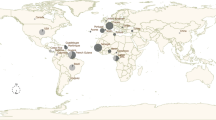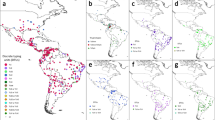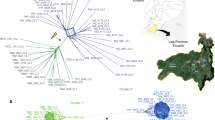Abstract
MILLIONS of cases of Chagas' disease exist in Central and South America1. Apart from being virtually incurable, a major problem in this disease is symptomless carriers harbour trypanosomes all their lives but it is often difficult to demonstrate the parasite2. At present, the simplest and most sensitive method of diagnosis3 is to feed uninfected triatomine bugs on the suspected case and subsequently to examine a faecal sample from the bug for the presence of trypanosomes. There is, however, great variation both within and between species of Triatominae, in their susceptibility to infection with Trypanosoma cruzi (see, for example, refs 4 and 5), and though a genetic basis for this variation in susceptibility has been suggested4, it has not been verified. Obviously, the production of a highly susceptible strain of triatomine bug that would provide a quick and accurate diagnosis of chronic Chagas' disease would be a distinct advantage. I report here on the selection of both susceptible and refractory lines of Rhodnius prolixus, and the results of this selection programme are related to the genetic control of susceptibility to infection with T. cruzi.
This is a preview of subscription content, access via your institution
Access options
Subscribe to this journal
Receive 51 print issues and online access
$199.00 per year
only $3.90 per issue
Buy this article
- Purchase on Springer Link
- Instant access to full article PDF
Prices may be subject to local taxes which are calculated during checkout
Similar content being viewed by others
References
Handler, B., Nature, 259, 357 (1976).
Marsden, P. D., Mott, K. E., and Prata, A., Gaz. med. Bahia., 69, 65–69 (1969).
Bull. Wld Hlth Org., 50, 459–479 (1974).
Phillips, N. R., and Bertram, D. S., J. Med. Ent., 4, 168–174 (1967).
Miles, M. A., Patterson, J. W., Marsden, P. D., and Minter, D. M., Trans. R. Soc. trop. Med. Hyg., 69, 377–382 (1975).
Lumsden, W. H. R., Herbert, W. J., and McNeillage, G. J. C., Technique with Trypanosomes (Churchill Livingstone, Edinburgh, 1973).
Mshelbwala, A. S., and Ormerod, W. E., J. gen. Microbiol., 75, 339–350 (1973).
Sherlock, I. A., and Almeida, S. P., Revta Soc. Bras. Med. Trap., 7, 87–98 (1973).
Falconer, D. S., Introduction to Quantitative Genetics (Oliver and Boyd, Edinburgh, 1967).
Falconer, D. S., Cold Spring Harb. Symp. quant. Biol., 20, 178–196 (1955).
Macdonald, W. W., in Genetics of Insect Vectors of Disease (edit. by Wright, J. W., and Pal, R.), (Elsevier, Amsterdam, 1967).
McGreevy, P. B., McClelland, G. A. M., and Lavoipierre, M. M. J., Ann. trop. Med. Parasit., 68, 97–109 (1974).
Hovanitz, W., Am. J. Hyg., 45, 67–81 (1947).
Falconer, D. S., Int. Union biol. Sci. Naples, B 15, 16–41 (1954).
Author information
Authors and Affiliations
Rights and permissions
About this article
Cite this article
MAUDLIN, I. Inheritance of susceptibility to Trypanosoma cruzi infection in Rhodnius prolixus. Nature 262, 214–215 (1976). https://doi.org/10.1038/262214a0
Received:
Accepted:
Published:
Issue Date:
DOI: https://doi.org/10.1038/262214a0
This article is cited by
-
The inheritance of radiation induced semi-sterility in Rhodnius prolixus
Chromosoma (1976)
Comments
By submitting a comment you agree to abide by our Terms and Community Guidelines. If you find something abusive or that does not comply with our terms or guidelines please flag it as inappropriate.



